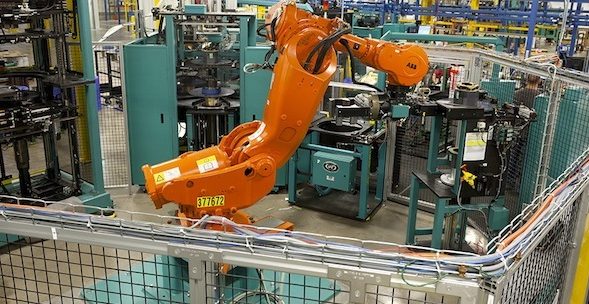State Chamber crowd primed for changing workforce, industry landscape
by November 6, 2019 2:25 pm 633 views

“The world is changing too fast.”
That’s one of a litany of concerns that Ted Abernathy outlined for about 600 statewide business leaders on Wednesday (Nov. 6) at the Arkansas State Chamber of Commerce/Associated Industries of Arkansas annual luncheon in Little Rock.
Abernathy, an economist and managing partner at North Carolina-based Economic Leadership, worked through a 45-minute presentation describing how low unemployment, a tight labor market, an aging workforce, urbanization, technology and education are moving so quickly that many businesses can’t possibly know what the landscape will be for their industry 10 years from now.
“Technology jobs and other jobs are going to be how we head forward and I would take a real strong look at where you’re growing, what types of jobs are already successful, and then try to double-down on what you’re already good at,” he said.
The speed of change, the power of data, and constant disruption from automation and innovation are contributors to predicting the hazy future for many companies. Abernathy noted that Arkansas is among the Top 15 states that will lose jobs due to the disruption.
“When you look at automation and what the impacts are going to be, it’s by type of occupation. So you can measure at the state level or even the county level,” he said. “If you know they’re going to be disrupted, then you need to start planning. That’s not going to mean you’re going to lose jobs. You’ll lose some, you’ll gain more, but it means you’re going to have to retrain almost everybody whose in those current jobs.
The availability of skilled labor is the No. 1 requirement driving business expansion and location, he said. But that will get more difficult as older baby boomers retire and younger millennials make up a smaller percentage of the population. Those millennials are also having babies at a much slower pace than previous generations and that is going to compound business owners’ need for new labor.
The trend is not just an Arkansas problem, it’s an American problem, Abernathy said.
“Nationally, there’s not enough labor. I was in a room last week where 80% of the businesses in the room said they would expand if they could find more people. Right now, what we’re seeing in the country is a throttle on our growth based on the fact that companies don’t have enough people to fill that need. So they’re drawing back, they’re adding robots, they’re doing what they can, but they’re forced to go overseas – not because it’s cheap labor, but because it’s labor anywhere,” he said.
Abernathy revealed data from a survey of roughly 400 business leaders from Arkansas and found:
- A majority of leaders were more satisfied with business taxes and healthcare than they were the skilled labor force;
- 61% said there was a disconnect between K-12 education and needed job skills; and
- 51% said there was a disconnect between what’s being taught in higher education and job skills.
Randy Zook, CEO of the Arkansas State Chamber of Commerce and Associated Industries of Arkansas, closed the annual meeting with a call for attendees to support next year’s half-cent sales tax for roads and highways. The ballot issue was referred by the Arkansas legislature and will be on the November 2020 ballot.
“We need this for good, high-value, safe, predictable highway transportation,” Zook said.
He also touted a new initiative to combat opioid abuse, a subject that is decimating workforces. Earlier in the day, the chamber announced the Arkansas Opioid Response Initiative, a toolkit of resources to help businesses and workers prepare, prevent and respond to the crisis. Arkansas Blue Cross and Blue Shield and the Arkansas Foundation for Medical Care are partners in the effort.
